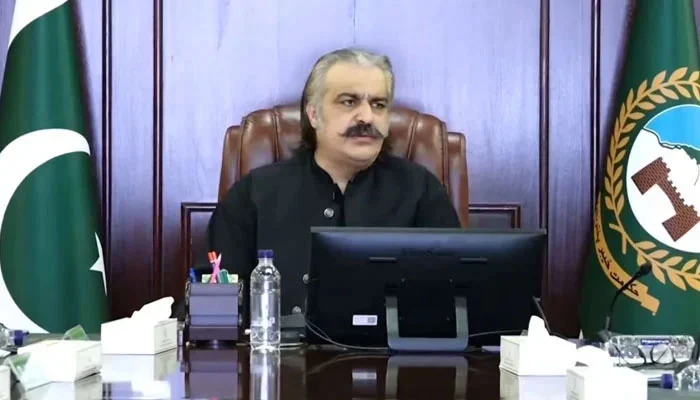The Khyber Pakhtunkhwa government has finalized a comprehensive counterterrorism plan to strengthen the civil administration’s role in tackling security threats. The initiative focuses on seven key areas, including security operations, governance reforms, legal improvements, and public awareness campaigns. Chief Minister Ali Amin Gandapur chaired a high-level meeting where officials approved the plan.
The move comes as Khyber Pakhtunkhwa remains the hardest-hit province in recent terrorist incidents. According to data from the Pakistan Institute for Conflict and Security Studies (PICSS), militants carried out 27 attacks in settled districts, killing 19 people, including 11 security personnel. In tribal districts, 19 attacks left 46 people dead, with casualties including security officials, civilians, and militants.
Strategic Framework and Implementation
The Khyber Pakhtunkhwa counterterrorism plan includes 84 targeted measures across 18 thematic areas. Responsibilities are assigned to provincial departments and federal agencies with clear deadlines. Strengthening state authority and restoring public trust remain central goals. Authorities will ensure strict enforcement of anti-terror laws while continuing military and police operations against extremists.
A comprehensive database of militants and their facilitators will be created. Schedule IV lists will be updated regularly, and individuals on the list will be closely monitored. Monthly reviews of bounty cases on wanted terrorists will also be conducted. Any government employee found aiding militants will face strict disciplinary action.
To enhance security forces, the Counter-Terrorism Department (CTD) and police will receive additional resources. New recruitment drives, training programs, and procurement of modern weapons are included. Infrastructure projects in southern and merged districts will be prioritized in the Annual Development Programme.
Border Security and Diplomatic Engagement
The plan also focuses on countering cross-border terrorism. A provincial delegation, following federal approval of terms of reference (TORs), will engage Afghan tribal elders in dialogue. Meanwhile, the federal government will be urged to strengthen diplomatic efforts with Afghanistan to curb infiltration.
Legal and Economic Reforms
To enhance intelligence coordination, the government will develop a centralized intelligence-sharing system. Local intelligence databases will be integrated with provincial and federal agencies. Regular meetings of security committees at divisional and district levels will be conducted.
Community engagement will play a key role in security oversight. Public Liaison Committees at police stations will be established to involve citizens in monitoring security threats. Authorities will also crack down on illicit financial networks linked to terrorism. Smuggling of weapons, narcotics, and illegal goods will be closely monitored, with AI-based scanning systems installed at transit points.
By August 1, 2025, all non-custom-paid (NCP) vehicles will be profiled, and GPS tracking will be implemented. Foreign funding audits of madrassas will be conducted to ensure transparency. Additionally, chemical substances used in explosives will be digitally tracked, while blockchain-based systems will monitor the movement of explosive materials. Oversight of arms sales and licensing will be upgraded with electronic tracking.
Development and Social Stability Measures
The Khyber Pakhtunkhwa counterterrorism plan also emphasizes economic uplift in terrorism-affected areas. Authorities will create job opportunities and vocational training programs for youth. Development of District Economic Plans and new economic zones in merged districts will be accelerated. To support farmers, financial incentives will promote high-value cash crops as an alternative to illicit trade.
For displaced populations, resettlement plans will ensure access to basic amenities in their hometowns. Legal reforms will enhance the judicial process for terrorism-related cases. Measures include reviving the Preventive Magistracy System, establishing special trial courts, and increasing prosecution staff for anti-terrorism cases. The government also plans to introduce faceless courts to protect witnesses and judges in high-risk cases.
Public Awareness and Monitoring
A public communication strategy will be launched to counter extremist narratives and educate citizens about government efforts. District-level security reviews will assess risks and recommend countermeasures. The government will also work towards political consensus on counterterrorism strategies.
A robust monitoring mechanism will ensure effective implementation. The Chief Minister’s Secretariat, Chief Secretary’s Office, Home Department, and relevant administrative bodies will oversee progress. The government remains committed to combating terrorism and securing peace in Khyber Pakhtunkhwa through this strategic action plan.


